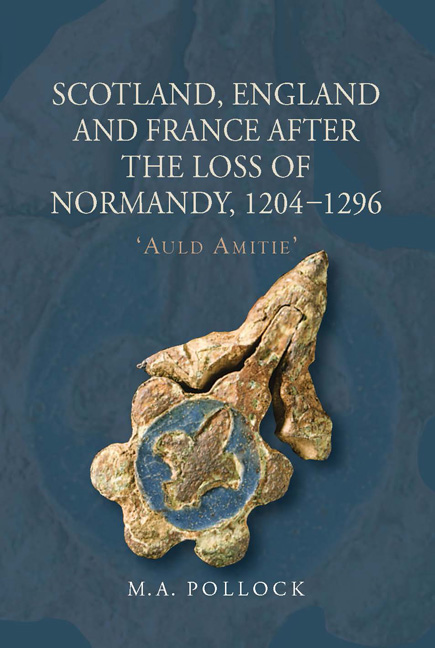Book contents
- Frontmatter
- Dedication
- Contents
- List of Genealogical Tables
- Acknowledgements
- List of Abbreviations
- Introduction
- 1 King John and Scotland after the Loss of Normandy
- 2 The Scots and the First Barons' War
- 3 Alexander and Henry III
- 4 War and Marriage: The French Dimension
- 5 The ‘Auld Alliance’: A New Beginning
- Conclusion
- Bibliography
- Index
Conclusion
Published online by Cambridge University Press: 05 May 2015
- Frontmatter
- Dedication
- Contents
- List of Genealogical Tables
- Acknowledgements
- List of Abbreviations
- Introduction
- 1 King John and Scotland after the Loss of Normandy
- 2 The Scots and the First Barons' War
- 3 Alexander and Henry III
- 4 War and Marriage: The French Dimension
- 5 The ‘Auld Alliance’: A New Beginning
- Conclusion
- Bibliography
- Index
Summary
The loss of Normandy in 1204 redefined relations between the three kingdoms. Gradually cross-Channel interests waned and the Anglo-French nobility became increasingly confined to lordships in France, England and/or Scotland. Aristocratic identities were simplified and reflected political interests in mainly England or Scotland for those who had renounced their French territories. The Wars of Independence introduced even more boundaries as families were forced, like in 1204 (between England and France), to choose between their lordships in England and Scotland. This was spelled out in the Cambuskenneth Parliament of 1314 when Robert de Brus declared forfeit all those who refused to give homage to him. Much like after the loss of Normandy, those who had chosen to renounce their lordships found refuge in England and supported the king of England's campaigns in France and then in Scotland. The difference was that in 1314 Scotland had never truly been ruled by the king of England. It had retained its own laws and customs despite Edward I's endeavour to Anglicise Scotland in the 1290s and those who had recognised Edward's overlordship in Scotland had done so very briefly. The problem for Scotland was that a number of those who had fled to England, called ‘the disinherited’, were powerful English landholders and they had powerful allies and kin still in Scotland. Twenty years after Cambuskenneth, these men were still enough of a threat nearly to topple the Brus dynasty when Edward III supported Edward de Bailleul's invasion of Scotland.
The Franco-Scottish alliance of 1295 was necessary to spell out a new type of relationship between the kingdoms. It hearkened back to an ‘auld amitie’ that relied on negotiations between the crowns but that was far less intimate than it had been earlier in the century. It sought to ensure that ‘the familial bond of this alliance and the faithful coming together of friendship may flourish all the more and endure with a greater stability, as it is better strengthened and bound by the auspices of a strong link [of marriage]’.
- Type
- Chapter
- Information
- Scotland, England and France after the Loss of Normandy, 1204–1296'Auld Amitie', pp. 218 - 220Publisher: Boydell & BrewerPrint publication year: 2015

